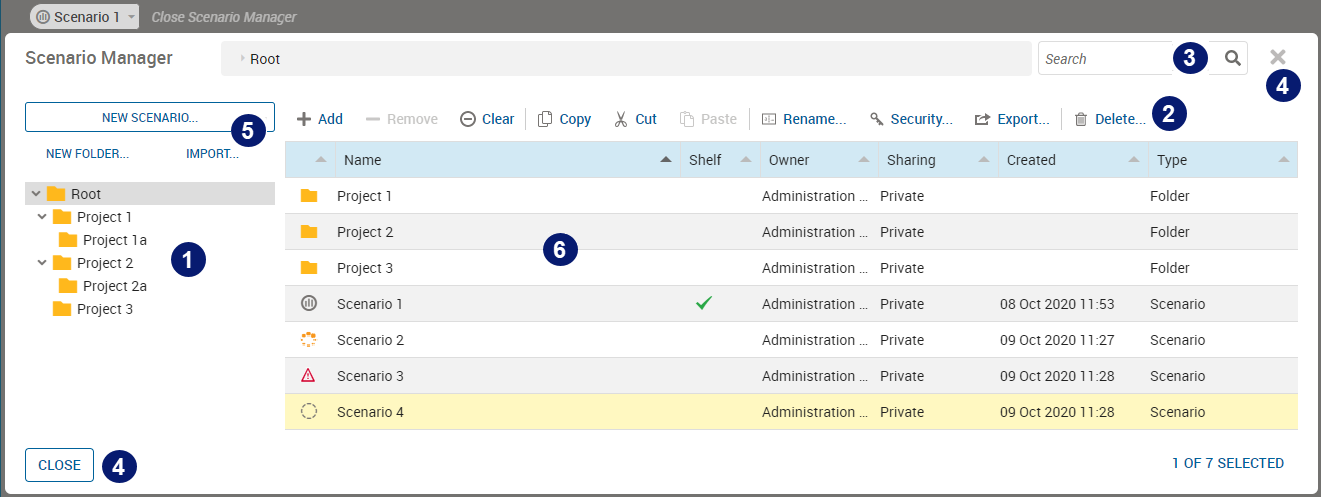Working with the Scenario Manager
- a self-contained copy of all input data required by one execution of the optimization model.
- all the results data produced by one execution of the optimization model.
- meta-data such as the scenario's owner, share status, and so on.
Many of the actions that can be done on scenarios are done through the Scenario Manager.
The Scenario Manager can be opened at any time by clicking in the grey area, known as the shelf, below the blue masthead.

| Item | Description | ||||||||||
|---|---|---|---|---|---|---|---|---|---|---|---|
| 1 | Folder list. Scenarios can be organized into containing folders | ||||||||||
| 2 | Actions menu - see Scenario Manager Actions Menu below for more. | ||||||||||
| 3 | Search box used to find a scenario by name | ||||||||||
| 4 | Close button | ||||||||||
| 5 | Buttons used to create a scenario or folder, or to import an existing scenario or folder | ||||||||||
| 6 | Scenario list displaying the scenarios stored in the folder selected from the Folder list (1) The following icons are used to identify the scenario status:
Note: A custom scenario type might display different icons. For more information, see
Custom Scenario Types in the
Xpress Insight Mosel Developer Guide.
|
Scenario Manager Actions Menu
- Add – Available when a scenario that is not on the shelf is selected in the scenario list. You can also double click a single scenario in the list; If the scenario is not on the shelf, it will be added. A scenario that is on the shelf is removed.
- Remove - Available when a scenario currently on the shelf is selected in the scenario list. You can also double click a single scenario in the list; If the scenario is not on the shelf, it will be added. A scenario that is on the shelf is removed.
- Clear – Remove all scenarios from the shelf.
 Note: This tool will not remove a
Note: This tool will not remove aprojectscenario type from the shelf. Use the Remove tool for this task. - Copy – Store a duplicate of the scenario selected in the scenario list on the clipboard (keyboard Ctrl-C/Cmd-C).
- Cut - Store the selected scenario on the clipboard and remove it from the list (keyboard Ctrl-X/Cmd-X).
- Paste – Insert a previously cut or copied selection from the clipboard into the current folder (keyboard Ctrl-V/Cmd-V). The button displays the number of items on the clipboard that can be moved. Pasted items are removed from the clipboard.
Custom scenario types might not allow certain operations and therefore disable the corresponding tool. For more information, see Custom Scenario Types in the Xpress Insight Mosel Developer Guide.
- Rename – Edit the selected folder or scenario name. You can still rename a scenario that is reserved for execution.
- Security – Opens a dialog to administer the list of users with access to the scenario and the scenario owner details.
- Export – Save a copy of the selected scenario as an
.insightformat file. If a scenario is executing, export will copy the scenario data and attachments that were present then the scenario was reserved for execution. - Delete – Destroy the selected scenario (keyboard Del/Backspace).

|
Note: If the page is displayed at a resolution below 1260 pixels wide, the tools will be represented by icons only.

|
- Properties – Edit the scenario notes and other scenario properties.
The options available in the drop-down menu are context sensitive dependent on the scenario status. For example, the PASTE option will not be available if you have not previously copied or cut a scenario.

|
Note: Tool availability will also be affected by the type of scenario you have selected.
Custom scenario types might not allow certain operations and therefore disable the corresponding tool. For more information, see Custom Scenario Types in the Xpress Insight Mosel Developer Guide. |
Keyboard Shortcuts
| Key Combination | Description |
|---|---|
| Ctrl+A/Cmd+A | Select All items |
| Ctrl+C/Cmd+C | Copy selected item(s) |
| Ctrl+X/Cmd+X | Cut selected item(s) |
| Ctrl+V/Cmd+V | Paste item(s) from Scenario Manager clipboard |
| F2/Enter | Rename single selected item |
| Del/Backspace | Delete selected items |
| Esc | Close Scenario Manager, if no dialogs are open |
Although all users have the basic ability to view and select scenarios, you must have authorization to use the Scenario Manager for other tasks such as deleting scenarios. Check with your organization's administrator as needed.
© 2001-2025 Fair Isaac Corporation. All rights reserved. This documentation is the property of Fair Isaac Corporation (“FICO”). Receipt or possession of this documentation does not convey rights to disclose, reproduce, make derivative works, use, or allow others to use it except solely for internal evaluation purposes to determine whether to purchase a license to the software described in this documentation, or as otherwise set forth in a written software license agreement between you and FICO (or a FICO affiliate). Use of this documentation and the software described in it must conform strictly to the foregoing permitted uses, and no other use is permitted.

